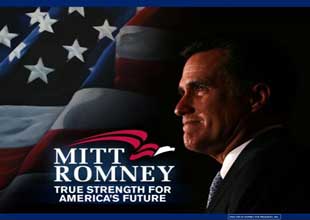Does Mitt Romney think tea partiers are nuts? It seems like a reasonable question to ask the potential presidential contender. While most of the other candidates hoping to run for the White House in 2012 have gone out of their way to prove their tea party bona fides, Romney has kept his distance, perhaps for good reason. Lots of tea partiers won’t forgive him for paving the way for the Obama health care reform plan with RomneyCare, as it’s dubbed, when he was governor of Massachusetts. But Romney’s speech at the Conservative Political Action Conference (CPAC) Friday was extremely well-received by an audience that included a healthy number of self-declared tea partiers. Indeed, he offered a lot a tea partier could love: talk of job creation, American exceptionalism, and a plug for the Constitution. He also has business credentials to die for, his health care record not withstanding.
But at least one tea party activist who’s been in contact with Romney’s campaign says that he has been reluctant to take one important move that would solidify his standing with the grassroots conservative movement: signing its “Contract from America.”
Last year, Ryan Hecker from the Houston Tea Party Society helped create a crowdsourced agenda that tea partiers wanted to see enacted in Washington. It emphasized limited government, fiscal responsibility and individual liberty, and asked signers to pledge to support a balance budget, tax reform, repeal of ObamaCare, a ban on earmarks, and to oppose cap and trade, among other things. The earmark ban scared off a fair number of candidates and members of Congress. But as Hecker says, “There’s nothing in there that a guy who doesn’t write legislation couldn’t support.” One of the first signers was Newt Gingrich. Sen. Jim DeMint (R-S.C.) was also an early endorser. But when Hecker, who appeared on a CPAC panel right before Romney took the stage, asked Romney to sign the contract, he “took a pass,” says Hecker, without explaining exactly why.
Hecker thinks Romney is an impressive candidate, who heroically turned around the Salt Lake Olympics, and is a “great businessman.” But Romney’s failure to sign the contract, says Hecker, hurts his standing with tea partiers, who are going to be critical to the 2012 election and who could potentially help Romney compensate for his problems with evangelicals who refuse to support his campaign. (They don’t like his Mormonism and still believe that he’s secretly pro-choice.) “I think it’s important that he sign the Contract with America,” Hecker says. “He needs to show that he’s listening to the tea party and that he’s going to be a leader who represents true conservatives.”






